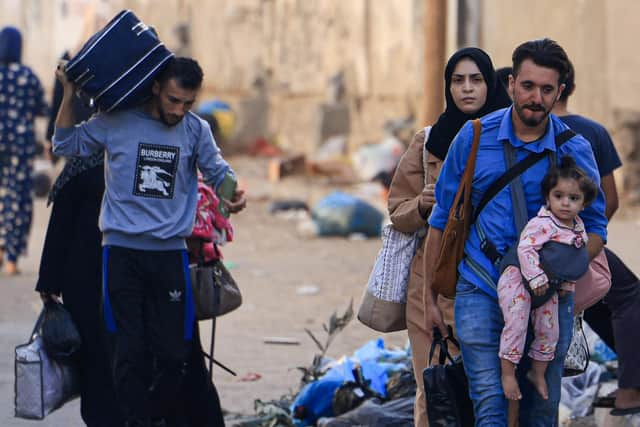Israel Hamas war: A ground invasion of Gaza may not be in anyone's best interests – Paul Wilson
The focus of the world remains firmly fixed on Israel, and the tanks and troops it has massed on its border with Gaza since the Hamas attack of October 7. When will the Israelis launch their ground offensive against the terrorist group embedded among the 2.3 million civilians living in the densely populated Gaza Strip?
Israel has urged civilians in the north to evacuate to the south as airstrikes pound buildings thought to house Hamas targets. But Israel continues to hold back on the ground, as the euphemistically termed “collateral damage” of its assault from the air mounts. Perhaps the Israelis sense they risk falling into a trap. Is there a better strategy? One that might stand a better chance of success and involve less loss of innocent life?
Advertisement
Hide AdAdvertisement
Hide AdHamas’s goal is to destroy Israel but it does not have the capability to do so alone. The inhuman barbarity of the October 7 massacre, which the perpetrators made sure to record and broadcast, was a deliberate provocation. Hamas must hope that, by provoking a sufficiently bloody retaliation, the military might of Iran will be drawn into a war and that will achieve the terrorists’ goal of wiping Israel off the map.


Israel must not make the mistake of doing what its enemy wants it to do. The temptation to unleash full “shock and awe” must have been almost overwhelming, given the atrocities of October 7, with more than 1,400 people slaughtered and more than 200 taken hostage.
But US President Joe Biden was quick to visit Israeli Prime Minister Benjamin Netanyahu and urge restraint. He spoke of the need to learn from “mistakes” made by the US after al-Qaeda’s attack, saying: “The government of Israel must not be blinded by rage.” Other Western presidents and prime ministers, including Rishi Sunak, have since made their way to the country carrying a similar message.
In that time, the ground invasion has remained “imminent”, perhaps while strategic calculations are made. Israel can see attention turning to the plight of the besieged Palestinians under aerial bombardment. Harrowing footage now emerges every day of children’s bodies pulled from rubble, along with reports of hospitals running out of power for incubators, clean water drying up and fears over the spread of disease.
This appears to have prompted the Israelis to release body camera footage from October 7 that shows in graphic detail the depths of depravity to which the terrorists sank. But, as the airstrikes on Gaza continue, there is likely to come a point when Israel cedes too much of its moral legitimacy in the eyes of the international community. UN Secretary-General Antonio Guterres indicated as much in New York this week.
Israel must protect itself, it cannot do nothing, but Benjamin Netanyahu’s leadership is weakened. His legacy will be stained by failing to advance peace with the Palestinians and by the catastrophic failure of his country’s intelligence services to pick up on warning signs ahead of the Hamas attack. But Biden is popular in the country. He might be able to steer the weakened Netanyahu away from his initial response to October 7.
Hamas is operating within a strip of land that is smaller than Arran but has 400 times the island’s population. Egypt, the Gaza Strip’s only other neighbour, is no fan of Hamas and is resisting calls to open its border. The Gaza Strip has been woefully mismanaged since Hamas won elections in 2006, which it contested under the name Change and Reform following Israel’s withdrawal in 2005.
After winning power, one of the changes Hamas enacted was to do away with elections, as is the way of tyrannical and totalitarian despots. There will be plenty who place the blame for conditions in the Gaza Strip before October 7 squarely at Israel’s door, but there will also be others who blame Hamas and have no one to turn to. It may be that units of Israeli special forces sent in to find the hostages could even get some support from Palestinians, perhaps among Hamas’s opponents in Fatah.
Advertisement
Hide AdAdvertisement
Hide AdIn Israel, hostages’ relatives must be horrified as they watch footage of airstrikes not knowing whether their family members are in the buildings and tunnels being bombed. There would still be many deaths on both sides but – by deploying special forces, scaling back airstrikes and allowing a constant supply of aid – civilian casualties could be drastically reduced. The Gazan population now has no one to turn to in their darkest hour. Hamas uses them as human shields. But some civilians could turn to those sent to free hostages and defeat the terrorists.
Hamas is loathed by some moderate Islamic groups and states in the region. Perhaps they would be willing to help overthrow them. Perhaps they could even also play a role in restoring peace and rebuilding. And then perhaps voices of moderation on both the Israeli and the Palestinian sides will come to the fore; people willing to at least be in the same room as each other.
Step by step, a process might unfold to work back towards the optimism of that day in 1993 when the Israeli and Palestinian leaders Yitzhak Rabin and Yasser Arafat shook hands in front of US President Bill Clinton at the White House. Then perhaps, talk of a peaceful two-state solution. Perhaps.
It is hard to have any hope amid the wreckage of today. But for decades it was impossible to see how peace could be achieved in Northern Ireland. The end of the Troubles is a beacon of hope that should guide Israelis and Palestinians alike as they try to find a way out of today’s darkness.
Comments
Want to join the conversation? Please or to comment on this article.